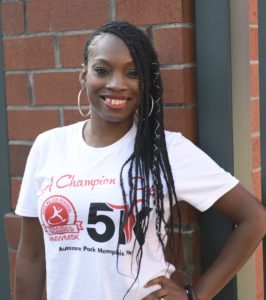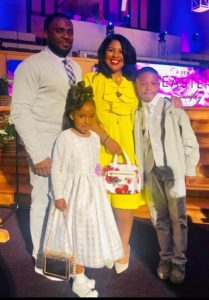After a December 2019 article on the cost of the two most recent sickle cell disease (SCD) treatments was highly criticized by members of the community, it became clear that knowledge on the disease, its types and complications was disparate.
We’ve Heard the Stories

Laterrica at SCD Walk in Memphis
Over the years, our Faces of SCD storytelling series revealed a knowledge gap between the community members we interviewed and the individuals they interact with on a day-to-day basis. Take Laterrica, a SCD warrior Sick Cells interviewed in Memphis in 2019, as a perfect example. After asking her if teachers cooperated with her while she was in school she told us no.
“No, no. It took a long time for people to understand what sickle cell is. I had teachers be mean to me. I had a teacher actually tell the class, ‘she got sickle cell.’ I had everybody look at me different, like I was a weirdo,” said Laterrica.
Jew-El, another warrior we met in Memphis, had a similar experience. “My teachers were actually the worst and they fought us on everything. My mom was always at the school fighting for my 504 Plan. I had everything in place but the teachers weren’t receptive to anything.”
Rod, the father of a daughter with sickle cell who we met in Chicago, told us about a similar struggle he experiences with nurses.
“When you go into the hospital in a crisis situation, we’re still at the point where we’re trying to educate the triage nurses when you bring your kid in. Your kid was okay yesterday, now they’re sick. Now, you’ve got the opioid epidemic. It’s becoming harder and harder to even get pain medication for the sickle cell child. My hope and my prayer is that enough attention will be drawn on this disease to at least get rid of those stereotypes or educate people on it.”
This knowledge gap has led the SCD community to inform and educate each other to ensure resources and new research developments are widespread. Not only does this exchange of information encourage patients to advocate for themselves but it helps them confidently educate those around them — whether that’s family, friends, medical professionals or teachers.
Identifying Opportunities to Learn

Nikia with family
Sick Cells spoke with Nikia Vaughn, a Johns Hopkins communications coordinator and community health worker, and the wife and mother of sickle cell warriors, about how she stays informed on community happenings.
“Past stigmas around the Black community and healthcare make people scared but we have a responsibility to read, look at data and continue to educate ourselves,” said Nikia. With three new sickle cell-focused treatments entering the market in the last three years, there’s plenty of research to do. “Every person is different and therapies are different for everyone. Endari may be a good fit for you but not others.”
While the COVID-19 pandemic limited the ability to meet in-person for conferences, fundraisers and support groups, virtual conferences such as the 12th Annual Sickle Cell Disease Educational Seminar: Global Approach to Sickle Cell Disease, Facebook groups and platforms like oneSCDVoice can keep the community connected and informed.
“The future’s looking bright. Healthcare providers are helping and they care,” said Nikia. “From bone marrow transplants, looking for a universal cure and patients living longer, as long the community sticks together we will move forward.”
For more information about what’s happening in the sickle cell community, and to keep tabs on upcoming events, check out our Events Calendar at https://sickcells.org/calendar/